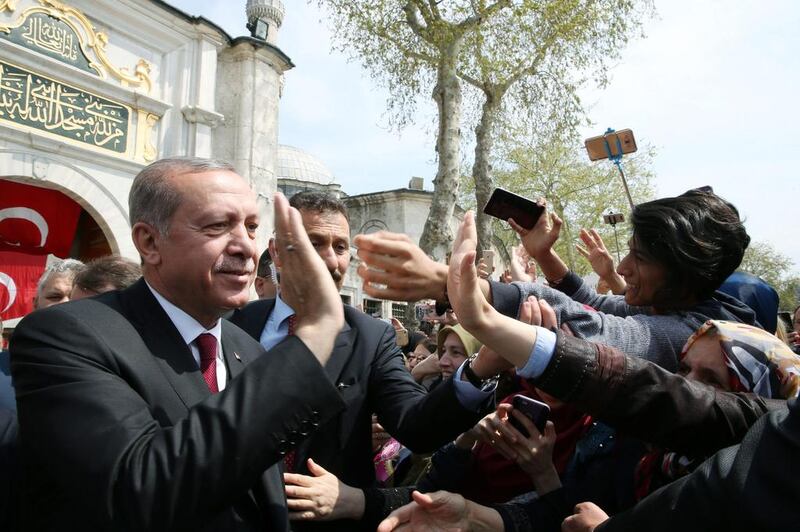ISTANBUL // Turkey’s referendum campaign was conducted on an “unlevel playing field” and the vote count itself was marred by late procedural changes, international observers said on Monday after president Recep Tayyip Erdogan won a narrow victory in a vote granting him sweeping powers.
“The referendum took place on an unlevel playing field and the two sides of the campaign did not have equal opportunities,” said Cezar Florin Preda of the joint mission of the OSCE Office for Democratic Institutions and Human Rights (ODIHR) and the Parliamentary Assembly of the Council of Europe (Pace).
“Late changes in counting procedures removed an important safeguard,” Mr Preda added, referring to a move by the election authorities to allow voting documents without an official stamp.
Turkey’s main opposition party on Monday urged the country’s electoral board to cancel the results of a landmark referendum, citing what it called substantial voting irregularities.
With political tensions once again escalating in Turkey after a contest opponents fear will hand Mr Erdogan one-man rule, German Chancellor Angela Merkel called for dialogue to seek calm.
The referendum was seen as crucial not just for shaping the political system of Turkey but also the future strategic direction of a nation that has been a Nato member since 1952 and an EU hopeful for half a century.
The Yes camp won 51.41 per cent in Sunday’s referendum on a new presidential system and the No camp got 48.59 per cent, according to near-complete results released by the election authorities.
But Mr Erdogan’s victory was far tighter than expected, emerging only after several hours late Sunday which saw the No result dramatically catch up in the later count.
Turkey’s three largest cities — Istanbul, Ankara and Izmir — all voted No although Yes prevailed in Mr Erdogan’s Anatolian heartland.
"On April 17, we have woken up to a new Turkey," wrote the pro-government Hurriyet columnist Abdulkadir Selvi.
“The Yes was victorious but the people have sent messages to the government and opposition that need to be carefully considered.”
The new system is due to come into effect after elections in November 2019.
Mr Erdogan is set to rejoin his ruling Justice and Development Party (AKP) after the referendum win expanding his powers, a party official said on Monday.
“We will offer membership to Erdogan after April 27-28,” Mustafa Elitas, parliamentary faction chief of the AKP, which Mr Erdogan cofounded, said according to the private NTV television.
After being elected president in 2014, Mr Erdogan had to severe ties with the party under the impartiality principle of the constitution but the planned changes that passed by popular vote on Sunday would open the way for a party-affiliated president.
In a bid to get back to business, Mr Erdogan was on Monday to chair a cabinet and security meeting at his presidential palace that could extend the nine-month state of emergency brought in after the July 15 failed coup, Turkish media said.
But the opposition were not content to rest on their better-than-expected performance despite a lopsided campaign in which the Yes camp enjoyed vastly greater resources and dominated the airwaves.
Both the main opposition Republican People’s Party (CHP) and the pro-Kurdish Peoples’ Democratic Party (HDP) said they would challenge the results from most of the ballot boxes due to alleged violations.
“There is only one decision to ease the situation in the context of the law — the Supreme Election Board (YSK) should annul the election,” the Dogan news agency quoted CHP deputy leader Bulent Tezcan as saying.
The opposition were particularly incensed by the election board’s decision to allow voting papers without official stamps to be counted, which they said opened the way for fraud.
“The Higher Election Board has thrown a shadow on the people’s decision. They have caused the referendum’s legitimacy to be questioned,” said CHP chief Kemal Kilicdaroglu.
Overnight sporadic protests by disgruntled No voters erupted in parts of Istanbul, with demonstrators banging pots and pans to voice their discontent.
"A victory of the nation," said the headline in the pro-government Yeni Safak daily. "Turkey has won."
But the Cumhuriyet opposition daily focused on the alleged violations: "A shadow fell over the ballot boxes," it said.
* Agence France-Presse and Associated Press





